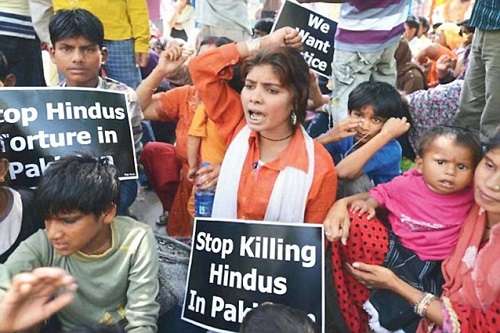
The Plight of the Hindu Community in Pakistan
By Dr. Avi Verma Publisher
The Hindu community in Pakistan is an ancient and integral part of the country’s cultural and religious fabric. With a rich heritage and significant contributions to society, the community’s current state is a matter of grave concern. The Hindu places of worship, such as the Hinglaj Mata Mandir in Balochistan, Krishna Mandir in Lahore, Katraj Mandir in Karachi, and Siddhivinayak Mandir in Tharparkar, are not just religious sites but symbols of the historical and cultural legacy of the Hindus in Pakistan.
Unfortunately, these sites, along with the Hindu community, face numerous challenges. Many temples are in a state of disrepair, facing vandalism, neglect, and unauthorized usage. The broader Hindu community in Pakistan endures significant hardships, including religious discrimination, violence, and economic marginalization. The abduction, forced conversion, and marriage of Hindu girls remain particularly egregious issues that need urgent attention.
Role of Hindu Leaders in Pakistan
Hindu leaders in Pakistan, such as Dr. Ramesh Kumar Vankwani, Veerji Kohli, and others, have been vocal advocates for the rights and safety of their community. Their presence in the government and their continued efforts to raise awareness about the issues faced by Hindus are crucial. However, the challenges they face are substantial, and their influence is often limited by broader systemic issues.
These leaders must take a more assertive role in addressing the concerns of the Hindu community. They need to:
Advocate Strongly: Use their positions in the government to consistently and forcefully advocate for the protection and rights of Hindus. This includes pushing for stricter laws and policies against forced conversions and abductions, and for the preservation and restoration of Hindu religious sites.
Engage with International Bodies: Collaborate with international human rights organizations and platforms to bring global attention to the plight of the Hindu community in Pakistan. This can help in applying pressure on the Pakistani government to take concrete actions.
Community Mobilization: Work closely with local Hindu communities to ensure that their voices are heard and their needs are addressed. This includes organizing community meetings, creating support networks, and providing legal and social assistance.
Interfaith Dialogue: Promote interfaith dialogue and understanding to foster a more inclusive and tolerant society. Engaging with Muslim leaders and other religious communities can help in building solidarity and support for the Hindu community.
Transparency and Accountability: Ensure transparency and accountability in their actions and decisions. By building trust within the community, they can better mobilize collective efforts and resources to address the challenges faced.
Recommendations for the Government of India
The Government of India can play a pivotal role in addressing the plight of the Hindu community in Pakistan. Here are some recommendations:
Diplomatic Engagement: Engage in consistent and constructive dialogue with the Pakistani government, emphasizing the importance of protecting minority rights and preserving religious sites.
International Advocacy: Leverage international platforms, such as the United Nations and human rights organizations, to highlight the issues faced by Hindus in Pakistan and advocate for their protection and rights.
Support and Relief: Establish dedicated funds and initiatives to support the restoration and maintenance of Hindu temples and cultural sites in Pakistan. This can be done through partnerships with NGOs and international heritage organizations.
Legal Assistance: Provide legal aid and support to Hindu families in Pakistan, especially those affected by abductions, forced conversions, and other forms of persecution. Collaborating with international legal bodies could enhance the impact of these efforts.
Community Support Programs: Develop programs aimed at the economic and educational upliftment of the Hindu community in Pakistan. Scholarships, vocational training, and entrepreneurship programs can help empower the community.
Cultural Exchanges: Promote cultural exchanges that highlight the shared heritage between India and Pakistan. These exchanges can foster mutual respect and understanding, thereby strengthening the cultural bonds between the two nations.
Humanitarian Aid: In cases of extreme persecution or humanitarian crises, India should be prepared to offer asylum and support to affected individuals and families from the Hindu community in Pakistan.
Conclusion
The dignity and rights of the Hindu community in Pakistan are paramount, and it is imperative that concerted efforts are made to ensure their protection and well-being. Hindu leaders in Pakistan must take the lead in advocating for their community, supported by robust measures from the Indian government and the international community. By working together, we can strive for a future where the Hindu community in Pakistan can live with dignity, security, and freedom.